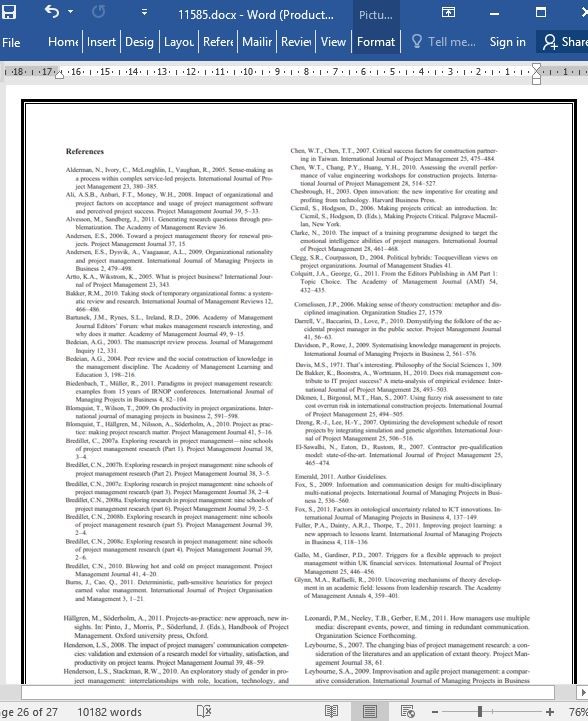
ساخت سوالات پژوهش در مدیریت پروژه
چکیده
این مقاله به بررسی چگونگی ایجاد فرصت همکاری در تحقیقات پروژه می پردازد. در این مقاله، استدلال هایی که زمینه ساز ایجاد سوال پژوهش هستند، مورد تجزیه و تحلیل قرار گرفته و نقش آن ها در ساخت نظریه منعکس می گردد. تحلیل موردنظر مبتنی بر بررسی 61 مقاله منتشر شده بین سال های 2007 و 2011 در چهار خروجی اصلی مدیریت پروژه است. نتایج نشان می دهند که سوالات، شکاف های پژوهشی موجود را شناسایی کرده و به جای به چالش کشیدن فرضیات نظری، ادبیات پژوهشی را گسترش می دهند. ]غالبا[ بحث می شود که برتری «کشف شکاف» مانع گسترش حوزه پروژه با نظریه سازی می شود که این امر موجب به چالش نکشیدن فرضیات قدیمی که گاها ممکن است نادرست باشند، می گردد. بنابراین پژوهشگران اصرار دارند که در ادعاهایشان بی باک تر بوده، پیشنهادهایی در مورد چگونگی دستیابی به این هدف، ارایه دهند.
1.مقدمه
با افزایش سریع مقالاتی که در مجلات مدیریت رده بالا به پروژه ها می پردازند، زایش نوین مجلات مدیریت پروژه اختصاصی جدید، شمول مجلات پروژه فعلی در نمایه نقل قول علوم اجتماعی و نشر افزایش یافته صنعت، تاثیر فزاینده ای بر عمل و رویه های موثر گذاشته، به بررسی چگونگی ایجاد فرصت های مشارکت در تحقیقات پروژه پرداخته شده است. سوالات پژوهش در این زمینه، بنیادی بوده و دامنه، هدف یا کمک به فعالیت های دانشگاهی و یا مشارکت در عمل و رویه ها را تعیین می کنند. سوالات پژوهش که به خوبی و با دقت تنظیم شده اند ممکن است ایده های قدیمی را توسعه داده و ایده های جدید را متحول کنند. به بیان ساده، نوع سوالات پژوهشی که سوال می گردند، معین می سازند که چه نظریاتی در نهایت ساخته می شوند.
5.نتیجه گیری
نظریه پردازان به دلیل اقدام در بسط و توسعه به دقت کار شده نظریات موجود، به یاد سپرده نمی شوند. هیچ نظریه بزرگی بدون به چالش کشیدن فرضیات اساسی به دست نمی آید. با این حال، نتراشیدن و کار نکردن دقیق بر روی حوزه های تحقیقاتی، خطر از دست رفتن اعتبار آن را به همراه دارد. با این وجود، سوال پژوهش، بخش یکپارچه شده ای از هر دو شیوه است. چون ساخت های سوالات پژوهش، با ارجاع به چگونگی بیان شدن آن ها در متون مقالات، مورد بررسی قرار گرفته اند، مقاله حاضر نمی تواند فراتر از آن متون، چیز دیگری درباره چگونگی ساخته شدن سوال پژوهش، بگوید. بنابراین تحلیل مورد نظر به آنچه نوشته شده، محدود می گردد. این مقاله بر این موضوع تمرکز ندارد که آیا نتایج به خودی خود «جالب» بوده اند، بلکه صرفا به فرصت های ایجاد شده برای جالب شدن توجه دارد.
Abstract
This article examines how opportunities for contributions are created in project research. In the article the arguments that underlie research question constructions are analyzed and their role in theory construction is reflected upon. The analysis is based upon a review of 61 papers published between 2007 and 2011 in the four major project management outlets. The results show that questions identify gaps and extend literature rather than challenge the theoretical assumptions. It is argued that the dominance of “gap spotting” hampers the development of the project field by producing theories that do not challenge long-held, sometimes possibly false, assumptions. Researchers are therefore urged to become bolder in their claims, some suggestions on how to achieve this are offered.
1. Introduction
With the proliferation of papers dealing with projects in the top-tier management journals, the recent birth of new dedicated project management journals, the inclusion of the established project journals in the Social Science Citation Index and an increased industry diffusion creating a tremendous impact in working practices, it is about time to examine how opportunities for contributions are created in project research. Research questions are fundamental in that they set the scope, aim or contribution to academia or to practice. Well-grounded and carefully formulated research questions may extend old ideas and develop new ideas. Simply, the kinds of research questions that are asked determine what theories are eventually produced.
5. Conclusions
Theorists are not remembered for having carefully chiseled out extensions of existing theories. Nor are great theories achieved without challenging basic assumptions. Without the careful chiseling research areas however run the risk of losing its credibility. Nevertheless, the research question is an integrated part of either craftsmanship. Since the research questions' constructions were reviewed with reference to how they were expressed in the papers' texts, the present paper cannot say anything about how the research question was constructed beyond that text. Therefore, the analysis is limited to what is written. Neither does this paper focus upon whether the results were “interesting” per se, but merely upon the created opportunities for becoming interesting.
چکیده
1.مقدمه
1.1.توسعه نظریات مربوط به تحقیقات پروژه
2.1. چهره جانوس در توسعه نظریه
3.1.ساخت سوالات پژوهش
2.روش
3.یافته ها
4.بحث
1.4. حالات شناسایی شده تشخیص خلاء در ساخت سوالات پژوهش
2.4. برتری و تفوق به وسیله کشف خلاء
3.4.حیات بخشی به مدیریت پروژه
5.نتیجه گیری
Abstract
1. Introduction
1.1. Developing theories for and of project research
1.2. The face of Janus in theory development
1.3. The construction of research questions
2. Method
3. Findings
4. Discussion
4.1. Identified gap-spotting modes of constructing research questions
4.2. Dominated by gap-spotting
4.3. Vitalizing project management
5. Conclusions
- اصل مقاله انگلیسی با فرمت ورد (word) با قابلیت ویرایش
- ترجمه فارسی مقاله با فرمت ورد (word) با قابلیت ویرایش، بدون آرم سایت ای ترجمه
- ترجمه فارسی مقاله با فرمت pdf، بدون آرم سایت ای ترجمه



